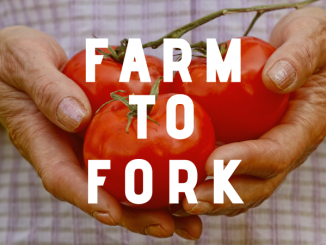
Lawmakers from the European Parliament’s agriculture committee have greenlit their opinion on the EU’s plan to slash the use and risk of pesticides in half. The agriculture committee (AGRI)’s opinion calls for pushing the target date back from 2030 to 2035, scrapping a ban on the use of pesticides in sensitive areas and blocking the use of the EU’s farming subsidies programme (CAP) to fund pesticide reduction ambitions. So what happened and what’s next? Natasha Foote and Oliver Moore report.
The opinion on the EU’s sustainable use of pesticides regulation (SUR), spearheaded by Socialist MEP Clara Aguilera, was approved by agriculture lawmakers on Monday (9 October) by a strong majority after hours of deliberation wading through nearly 200 pages of amendments.
The contentious SUR proposal aims to slash the use and risk of pesticides in half by 2030, as set out in the EU’s flagship food policy, the Farm to Fork strategy. However, in their opinion, agriculture lawmakers proposed pushing back the goalposts from 2030 to 2035.
Meanwhile, MEPs also called to scrap a proposed ban on the use of pesticides in sensitive areas, instead calling for restrictions or bans on the use of plant protection products in each area to be set by EU countries.
In this scenario, EU countries would be able to choose between low-risk products, all products authorised for organic farming and so-called category 1 and 2 plant protection products. In this way, member states would be able to modulate their application according to the specific needs of the area, and this would then be communicated to the Commission in their national action plans.
The AGRI committee is not the lead committee on the new pesticide rules as it shares competence on parts of the file with the Parliament’s environment’s committee (ENVI).
As such, the opinion does not carry much weight, and sources in the Parliament’s ENVI committee told ARC that they were “hopeful” that many of the amendments would be overruled in its vote, due to be held between 23-24 October.
However, the opinion from the agriculture side of the Parliament does signpost potential bones of contention in the plenary vote on the matter, pencilled for the November session.
Game over for CAP funding?
Most controversially, agriculture lawmakers also voted to reject, by a large majority, an article which would link the EU’s farming subsidy programme, the Common Agricultural Policy (CAP) to the SUR.
Practically speaking, this means that CAP funding would be blocked from being used to support farmers in reducing the use of pesticides and implementing the requirements of the SUR. In doing so, the agriculture committee has also chosen to forgo its only real power in the debate on the SUR, given that the committee has exclusive competence over this article.
Can ENVI overturn the decision?
On this point, lead MEP Aguilera said she was hopeful that the environment committee will “incorporate what has been agreed [by the agriculture committee] without even putting it to the vote”.
Asked by ARC, the Parliament’s agriculture press officer explained that the committee responsible “shall accept without a vote amendments from an associated committee where they concern matters which fall within the exclusive competence of that associated committee”.
In the event that the committee responsible “fails to respect” the exclusive competence of the associated committee, that associated committee may table amendments directly in plenary, she added.
This means that, even in the event that the ENVI committee chooses not to accept its counterpart’s position on article 43, AGRI will likely table amendments directly in plenary.
‘A vote against farmers’
The decision to scrap this funding link was lambasted by campaign groups, who pointed out that a third of the EU’s budget – or around €387 billion – goes to subsidising farming in the EU.
For Marilda Dhaskali, EU agriculture policy officer at BirdLife Europe, the use of taxpayer money to help farmers reduce their use of pesticides should be a “no-brainer”.
“It will benefit the health of citizens, the environment, and even the farmers themselves. But the politicians sitting in the agriculture committee prefer spending public money on sustaining vested interests,” she said, adding that they have demonstrated “who they really serve, and it’s certainly not the citizens who elected them.”
Likewise, Pesticide Action Network Europe (PAN) called this a “vote against farmers, nature and food security,” stressing that Europe “deserves better”.
PAN Europe is one of 41 organisations to sign a “Joint Statement – for an ambitious Pesticide Regulation” on the SUR last week, which pointed to IPM (Integrated Pest Management ) being a legal requirement since 2014, “but implementation has failed”; moreover, that CAP 2023-2027 allows member states to “update their national strategic plans every year and make changes in their allocation of funds to align with SUR objectives.”
An earlier letter (5th October) about a specific aspect of the SUR process (article 43), signed by eleven organisations, was more explicit. It specifically referenced “budget foreseen in the CAP funds, as well as provisions in the CAP Regulation…to support farmers to reduce pesticide use”. This references “funding foreseen through eco-schemes”, agri-environmental and climate measures, investment grants, IPM and also the technical requirement to have farm advisory services for IPM.
But, for EU farmers’ organisation COPA-COGECA, the voted proposal presents an “acceptable compromise”, calling on lawmakers in the environment committee to “take the opinion into account”. (Read the Full COPA statement)
“AGRI MEPs made it clear that the CAP funds, which are already stretched, should not be used in supporting additional measures within the scope of the SUR proposal,” the association said in a statement.
The farmers’ lobby maintains that, as with other initiatives in the Farm to Fork strategy, the Commission “did not take the time to assess costs properly [and] who should pay for the transition”. As such, they said that they “understand and welcome their rejection”.
More on SUR
(Don’t) Show me the Money! Agri MEPs reject Green Cash Plan for Pesticide Reduction
SUR – Pesticide Regulation – Delayed by Additional Impact Assessment
COP out – all eyes on 19th Dec as Council aims to derail Pesticide Regulation (SUR)
SUR-ely not? Big Ag Backers Push to Derail Pesticide Regulation within Days
More on pesticides
The True Toll of Pesticides on Rural Health – Pesticides Analysis Part 2
Beyond the Harvest: Health Effects of Pesticides on French Farmers
EPP Attacks Pesticide Regulation & the Nature Restoration Law
France | Pesticides, PDOs & Plenty of Spin at Salon de l’Agriculture 2023







4 Trackbacks / Pingbacks
Comments are closed.